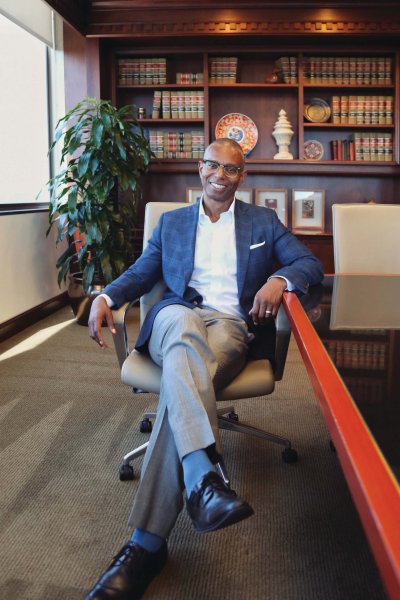From Software Engineer to the Pinnacle of Patent Law

Embarking on a career during the heady days of the dot-com boom would have been an ambitious enough prospect for many new engineering graduates. But Ellisen Turner, B.S. CECS ’97, had his sights set on mastering an equally challenging discipline: law. A software engineer who has worked for some of the biggest technology companies, including Hewlett-Packard and IBM, Turner made the leap to law. Today he is one of the most high-profile African-American litigators in the country.
Turner is a partner at Irell & Manella, a leader in intellectual property law and patent litigation. From his Century City office, he represents a range of clients, from aerospace behemoths and Silicon Beach startups to the gaming giant Activision Blizzard, the creator of “Call of Duty” and “World of Warcraft,” among others.
It’s an area of law that requires a niche skill set. Turner’s engineering background has set him apart from his peers, enabling him to translate complex concepts for judges and juries.
“The thing that I really love about my job is getting to know my clients’ businesses really well. There are few other jobs where you’re essentially paid to constantly learn about new technology, to work with amazing engineers and scientists and talk to them about what they’ve created,” Turner said.
Turner has received an impressive number of accolades in a short time, was recognized as a “Trailblazer Under 40” by the National Bar Association and recently was listed in the 2019 “Best Lawyers in America,” a peer-reviewed assessment of the top 5 percent of practicing lawyers.
His reputation is well earned. Turner has helped his clients win more than $5 billion in total compensation from patent litigations.
Turner forged his career in not one, but two disciplines that have historically suffered from a lack of inclusion. According to the American Bar Association’s National Lawyer Survey, in 2017 just 5 percent of respondents were black or African-American and 5 percent were Hispanic or Latino.
Turner believes the numbers are even less in his more technically focused area.
“In patent litigation, it’s certainly helpful to have a technical background,” he said. “When you couple the lack of diversity in the STEM field with the lack of diversity in the legal industry, you get this multiplier effect where it’s very difficult to build a diverse team of attorneys.”
A passion for engineering and technology
Turner grew up in Mount Pleasant, Michigan, in one of the few black families in his town. He gained a strong grounding as a diversity champion by watching his father, an affirmative action officer at Central Michigan University.
At the same time, Turner says he was always drawn to science and technology.
“I remember in third grade, we were asked to make a diorama showing our future career,” he said. “I chose scientist. I had this lab coat that my mom had gotten for me. Or maybe it was just a big white sweater.”
With his sights set on studying biomedical engineering in Pennsylvania, Turner’s planned college visit was derailed by a huge ice storm, he recalled. He looked to the sunny west, to USC, and “fell in love.”
It was more than just the leafy campus and idyllic weather that captured Turner’s heart. USC Viterbi is where Turner met his wife, Benilda Turner, BME ’97, as their eyes met during freshman year across a packed Chemistry 101 class in Bovard Auditorium.
It was also where Turner took part in the Minority Advancement Program, a bridge program to help underrepresented students find their feet at USC. This allowed him to form lasting connections with peers, meet professors and network with industry leaders.
“I saw how great it was for us — the camaraderie, the early access to professors — so that when real classes started, we just felt like the campus was already ours,” Turner said.
Promoting diversity and inclusion in technology and law
His experience in MAP inspired Turner to give back by supporting the Viterbi Summer Institute, a program that eases the transition from high school to the university for students from historically underrepresented backgrounds.
VSI offers a support network during students’ time at USC Viterbi and beyond. They share meals, take classes, work on research, hear from guest presenters and learn about support services such as the Center for Engineering Diversity.
“Having mentors like Ellisen, who experienced similar things to what they experience, allows them to see him and his career as an aspirational goal,” said Brandi Jones, vice dean for diversity and strategic initiatives, who noted that programs such as VSI depend on gifts from donors.
For Turner, programs like VSI are a vital step. He also plays a leading role in promoting diversity and inclusion in his field, founding the National Bar Association’s Diversity in Tech Awards, to recognize those who foster diversity and inclusion in the STEM and intellectual property fields.
“If you want to improve diversity in any particular field, then you have to start early,” Turner said.
“One of the things I saw from my father’s days as an affirmative action officer is there are no quick and easy answers,” he added.
“People should not expect that any of this will be fixed overnight by simply saying, ‘We’ll just hire more people.’ It’s got to be a broad-ranging effort for us, for both the legal industry and for the sciences as well.”



